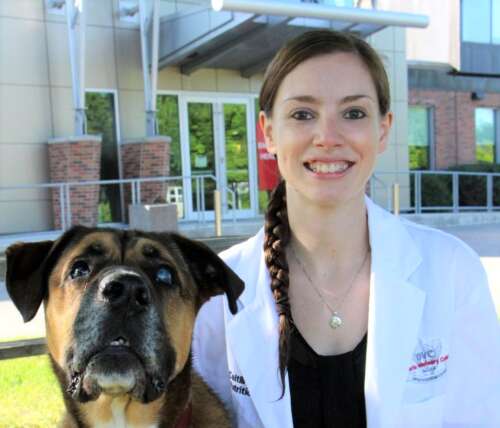
Dr. Caitlin Grant aims to ensure that pets eat right and that veterinarians have the information they need to provide sound advice to pet owners about the importance of proper nutrition for companion animal health.
The three-time University of Guelph grad has joined the Ontario Veterinary College (OVC) as the holder of the new Nestlé Purina Professorship in Companion Animal Nutrition.
Nestlé Purina will provide $450,000 over 2.5 years to enhance veterinary students’ education in companion animal clinical nutrition, broaden research in pet nutrition and expand opportunities to share information with pet owners and practising veterinarians.
“Companion animal nutrition is a very big part of veterinary medicine,” said Grant. “Just as with people, diet is the key to preventing chronic disease and to achieving optimal health of our pets. Practising veterinarians need to be comfortable with this aspect of preventive care.”
Grant’s faculty appointment will make OVC the only Canadian veterinary college with two specialists in companion animal nutrition. OVC is one of only three Canadian veterinary colleges with a clinical nutrition service and the only one offering a residency-training program in clinical nutrition.
“Industry partners like Nestlé Purina Petcare Canada share many of the same goals as we do as veterinary educators and researchers,” said OVC dean Dr. Jeff Wichtel. “With the addition of Dr. Grant to our accomplished nutrition team, OVC will have a powerhouse of companion animal nutrition knowledge and expertise to share with our students and the wider community.”
During her doctor of veterinary science studies completed in 2020 and a three-year residency in clinical nutrition at U of G, Grant helped to expand the OVC Health Sciences Centre Clinical Nutrition Service. She now joins the OVC nutrition team along with Dr. Adronie Verbrugghe, a professor in the Department of Clinical Studies; and Shoshanna Verton-Shaw, a registered veterinary technician and nutrition specialist.
“We are proud of our longstanding partnership with the Ontario Veterinary College,” said Todd Cooney, president of Nestlé Purina PetCare Canada. “At Nestlé Purina, we believe that all pets benefit from excellent nutrition. Advancing nutrition education and research through this professorship is part of our commitment to the role that veterinarians play in helping pets thrive.”
Nearly 60 per cent of pet cats and more than half of dogs are obese or overweight, according to the U.S.-based Association for Pet Obesity Prevention. “For veterinarians graduating today, one in every two pets that come through the door are going to need a weight loss plan,” said Grant, who studies nutrient intake and weight loss in pets.
In 2020, she published the first study to show that “dieting” cats fail to meet their requirement for the essential nutrients arginine and choline, according to 2006 National Research Council recommendations. That study indicated that eating less may be only part of the solution for obese cats, she said.
Much of Grant’s role under the new professorship will involve teaching and learning. She plans to widen the OVC nutrition curriculum for the 480 students enrolled across all four years of the DVM program. Students will spend more time on clinical nutrition topics, including more practical, case-based learning and greater emphasis on nutrition communication skills, she said.
“We’re trying to focus on how to talk about nutrition with pet owners. This will reinforce veterinarians as a trusted source of pet nutrition information, which can be challenging today considering the plethora of nutritional myths and potentially harmful advice that pet parents receive from online sources.”
Contact:
Dr. Caitlin Grant
grantc@uoguelph.ca